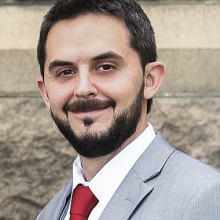Professional workforce development

Former U.S. Army Military Police Officer transitions to career at with DHS COE
For the U.S. Department of Homeland Security (DHS), keeping the country safe from a host of innovative and adapting adversaries is a never-ending task. Being prepared means understanding and predicting potential threats using combinations of research, modeling and intelligence.
As the first recipient of the Center for Accelerating Efficiency (CAOE) educational program veteran’s transition award, Doug Clifford knows first-hand what is at stake. As a veteran and a university student, Clifford combined his experience, interests, and studies to transition into successful career with the U.S. Homeland Security Enterprise (HSE). As project manager for two CAOE projects, his teams are doing innovative work that keeps DHS a step ahead.
Clifford sees his current role as a natural extension of his military and academic careers.
As a former U.S. Army Military Police Officer attaining the rank of Non-Commissioned Officer (NCO) Sergeant, he served in support of Operation Iraqi Freedom. After his military service, he attended the University at Albany, State University of New York (SUNY) as a non-traditional undergraduate student in the College of Emergency Preparedness, Homeland Security and Cybersecurity (CEHC). He graduated with a bachelor’s degree with a concentration in Homeland Security.
His early experience includes work on CAOE projects with Dr. Brandon Behlendorf and Dr. Gary Ackerman, after taking their classes as an undergraduate. He went on to work on DHS research in support of the “Simulation, Analysis, and Modeling for Border Apprehension and Security (SAMBAS).” In this position, he participated in the coding and review of geographic location data, summarizing previous border patrol research, legislation, and related apprehensions. At the end of the program, he presented related research to U.S. Border Patrol personnel as part of his transition experience. The initiative was so successful, Clifford was offered a full-time role in the HSE as program manager for the Center for Advanced Red Teaming.
His current teams include “Validating Adaptative Behavior Models of Adversaries for Risk Assessment (VABMARA) Framework and “Red Teaming the Post-COVID-19 Biological Weapons Threat Landscape,” where he serves as project investigator and coordinator. In these roles, he helps teams explore the use of Read Teaming to validate adversary behavior models and identify Biological Weapons that have emerged in the wake of COVID-19.
As a direct result of his experience in this role, Clifford has significantly increased his knowledge and skills in applied research, especially as it relates to Red Teaming. He believes the greatest challenge facing Homeland Security is the ability to keep up with our adversaries. “Adversaries adapt and innovate. We must continue to do so ourselves to ensure we remain resilient,” Clifford said. “I think and hope these projects will provide awareness on the effectiveness and vast potential of Red Teaming. The results will improve security efforts for DHA and across all security domains in the United States.”
